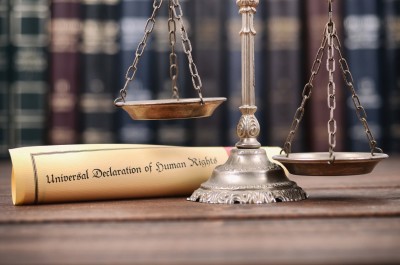A strange no-man’s-land of public morality

As the West becomes increasingly obsessed with “rights” and more alienated from a coherent anthropology or cosmology as their source, the road ahead winds sharply toward absurdity.
Throughout its history, Western Civilization has grappled with variations of the fundamental question, “What is man, and what separates him from the beast?” The classical philosophers found the answer in Reason. Christianity found it in the Imago Dei. The modern West, increasingly, answers with a shrug.
For the first time in American History, the majority of people don’t attend religious services regularly. In 2020, 47% of Americans said they belonged to a church, synagogue, or mosque, down from 50% in 2018 and 70% in 1999, with similar trends proliferating throughout Europe.
Not only is the West in a post-Christian age, but it also seems to be entering a post-religion age altogether. Filling the intellectual vacuum is a smorgasbord of secularism haunted by vestigial assumptions from a bygone Judeo-Christian world.
But, with these axiomatic pillars — belief in God, objective moral reality, and the dignity of the human person as endowed by a creator — toppled, the ethical structure built upon them cannot last long.
Public intellectual Yuval Noah Harari, in his best-selling book, Sapiens, acknowledges the endpoint: “There are no gods in the universe, no nations, no money, no human rights, no laws, and no justice outside the common imagination of human beings.”
While more Americans than ever reject religious answers to ontological questions like “What is a human being, and what dignities does she have as a result?” most still flinch at the intellectually honest materialist’s response: human rights and justice are all just figments of our collective imagination.
As a result, we’re left in a strange no-man’s-land of public morality.
In today’s discourse, every claim is couched in rights language — abortion, “sovereign citizenship,” gun ownership, healthcare, and the freedom to express one’s sexual identity are all lauded as “human rights” by various sects. But all you have to do is ask “why” a few times in a row, and, more often than not, we arrive at a sentimental explanation based on feelings of right and wrong, or else some variation of “it just is.”
Before we can determine whether any of the things from the above list are, in fact, human rights, we need to return to a basic understanding of the ontological status of human beings: who they are, what their nature is, and why it is so wrong to transgress their dignity.
In the words of Charles Malik, Lebanese diplomat and key contributor to the Universal Declaration of Human Rights, “If these rights are the mere product of … law as it happens to be at a particular stage in evolution, then clearly, since … law changes, my rights, and there with my very human nature, will change with it. But if, on the other hand, these rights express my nature as a human being, then there is a certain compulsion about them; they are metaphysically prior to any… law, and any such law must either conform to them or else be by nature null and void. Either man has an external essence which can be grasped and expressed by reason, or he dissolves without any remainder into the general flux.”
As the external essence of man, in Malik’s words, vanishes from our minds, our methods to articulate and defend the rights inherent to him become increasingly flimsy.
Nearly 75 years ago, when the United Nations adopted the UDHR, the seeds of today’s problems had already germinated. While the preamble and article 1, laying the foundation for the entire document, contain words like “recognition,” “inherent,” “inalienable,” “born,” and “endowed” — all heavily reminiscent of the “external essence” found in Christianity and Natural Law — even this modest recognition had to be established in the teeth of terrific opposition.
Seventy-five years later, the climate has shifted dramatically. If initially we were reluctant to employ necessary language like “recognition,” “endowed,” and “inherent,” today we are fully unwilling.
And without a foundation and source, human rights are nothing but a nice delusion — a mirage in the public imagination. A strong gust of wind could quickly overpower the rights we once recognized as inalienable.
Liza Ashley is Associate Director of the Charles Malik Institute at the Philos Project. She regularly writes and speaks on topics relating to religion, culture, and foreign policy.




















